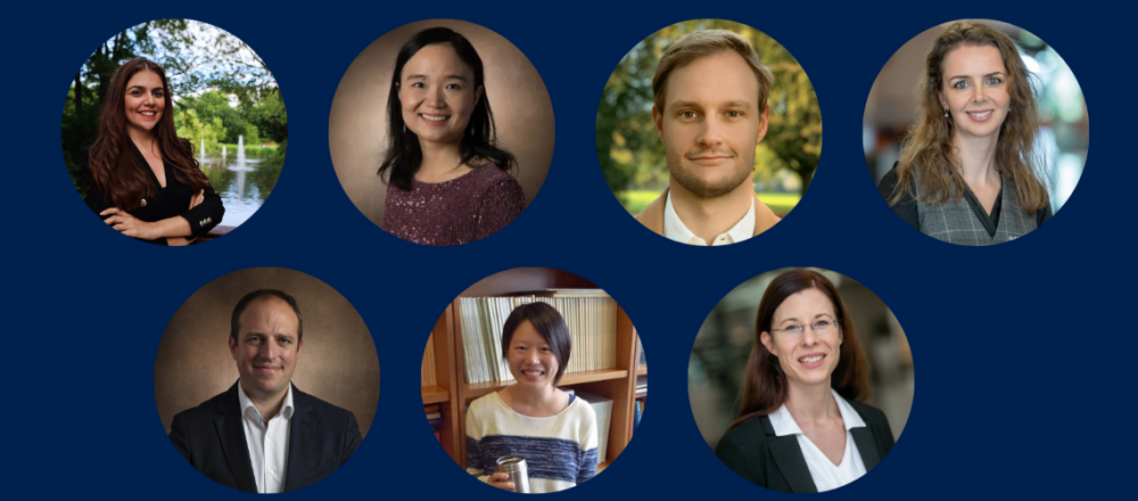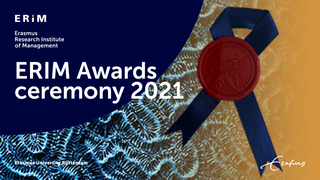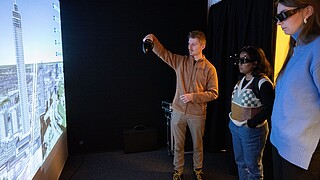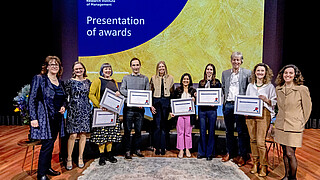This was the 22nd annual ERIM Awards for fellows, members, doctoral candidates, alumni and other members of the research community. Awards were presented for research in areas as diverse as motivations for joint value creation; measuring ambiguity aversion; how humans interact with artificial intelligences; the disclosure process in capital markets; and advocating for open science.
ERIM Top Article Award
Two awards were presented in this category:
The nature of capitalism
Flore Bridoux for Stakeholder Governance: Solving the Collective Action Problems in Joint Value Creation. Flore is Professor of Stakeholder Management in the Department of Business-Society Management at RSM. Her research was published in the journal of the Academy of Management and looks at motivations for joint value creation. Only recently has it been recognised that stakeholders engaged in joint value creation face collective action problems: they may be tempted to pursue their own interest at the expense of maximizing joint value creation. Flore’s research compares the effectiveness of three forms of governance and their dependence the nature of joint value creation activities.
The jury commented: “Prof. Bridoux’s article, co-authored with Jan-Willem Stoelhorst, is not only the best-cited article of all nominated submissions – it is also a very fundamental article on the nature of capitalism that made the jury members pause and think. Many of the challenges of contemporary capitalism cannot be resolved through simple trade, which can be self-enforcing because it tends to be beneficial to all the parties involved. Instead, addressing problems like climate change, inclusive wealth creation, and diminishing returns on healthcare innovation investments require joint value creation through collective action. The point is that all parties to such action have incentives to walk away from cooperation. The article makes a strong plea that firms should stop thinking of themselves as clearing houses for stakeholder interests. Instead, what is needed is a different role, either as network orchestrators or as custodians of stakeholder governance norms. The article is masterpiece of conceptual parsimony and cross-disciplinary thought.”
Disentangling the properties of ambiguity
Chen Li, associate professor in the Erasmus School of Economics for Randomize at Your Own Risk: On the Observability of Ambiguity Aversion published in the Journal of the Econometric Society. When people face several decisions, some consider each one in isolation or integrate them into a single optimisation problem, but each option may yield a different decision according to the conditions. Chen Li’s research investigated whether the random incentive system in experiments that measure ambiguity aversion provides a hedge against ambiguity, making ambiguity‐averse subjects who integrate behave as if they were ambiguity neutral.
The jury commented: “One of the greatest feats of social science is to take on the complexities of human behaviour and cognition and to capture these in exceedingly simple experiments. Together with her co-authors Aurelien Baillon and Yoram Halevy, this is precisely what Dr Chen Li has done in this clever experimental article. Theoretical interest in the interplay between randomisation and ambiguity has long been strong but the translation to experimental work calls upon researchers to meet the very practical challenge of making respondents reveal their ambiguity attitudes. Dr Chen Li has managed to disentangle whether individuals are prone to isolate or integrate multiple decisions when these confront them simultaneously. The article offers an exemplary view of the latest generation of experiments to be used in behavioural economics.”
ERIM Best Full-Time PhD Dissertation Award
Two awards were presented in this category.
How consumers respond to algorithmic decisions
Gizem Yalcin Williams, Assistant Professor of Marketing at UT Austin prepared her PhD thesis at RSM. Consumers in the Age of AI: Understanding Reactions Towards Algorithms and Humans in Marketing Research was recognised with the Best Full-time PhD Dissertation Award. Its goal was to examine whether and why consumers react to algorithms and humans differently. It offers a counterpoint to the pervasive ‘algorithms-are-bad’ rhetoric in contemporary marketing literature and adopts a nuanced perspective on consumers’ reactions towards algorithms and humans. It reveals how consumers’ reactions depend on the outcome of the decision, who the consumer is, and on what type of complexity the decision possesses.
The jury commented: “With her dissertation work, she was literally ahead of the curve by beginning to ask salient questions on how humans interact with artificial intelligences well before most humans realised that they already interact with artificial intelligences daily. Her work presents a holistic contingency framework and addresses important questions on how consumers respond to algorithmic decisions. It shows that consumers do not react negatively to all such decisions, but that decision receptiveness differs with decision valence, subjective knowledge, and decision complexity. Dr Yalcin Williams is a deserved winner, as her dissertation work is a hallmark of foresight and relevance.”
Financial information and market frictions
Jeroen Koenraadt was presented with the Best Full-time PhD Dissertation Award for his doctoral thesis Essays in Financial Accounting. Jeroen is now assistant professor of accounting at the London School of Economics. His thesis looked at the disclosure process in capital markets, which is essential for them to function well. However, there are frictions in the disclosure process that lead to sub-optimal outcomes, and therefore a need to understand the role of financial information and market frictions in the financial information environment in a broader perspective. His dissertation comprised three studies that build on the understanding of the constantly changing information environment and the role of regulators, gatekeepers, and intermediaries in addressing market frictions.
The jury commented: “His dissertation opens new avenues for the analysis of how market participants obtain and use financial information. We particularly approve of the programmatic approach Dr Koenraadt uses. He keenly appreciates the roles played by regulators and information intermediaries in shaping and disseminating financial information. Sincere compliments are in order for an excellently theorized and researched dissertation.”
ERIM Open Science Award
A better way of being a scientist
This award is not for a single paper or piece of work. The jury considered multiple factors and the award recognises and honours demonstrable commitment to the principles and practices of open science. It was presented to Thomas Peeters, associate professor at the Erasmus School of Economics. The jury commented: “Dr Thomas Peeters is an open science advocate and champion on many levels.
First, he has made open science the default for the way in which he himself practices science, as he ensures that the data and code underlying his publications is FAIR and available to anyone who takes an interest in them. Second, he also shares his knowledge of and enthusiasm for open science in the classroom, and he is determined to instil the ethos of open science in future generations of college graduates and scientists. Third, he has always seen the general public as an important stakeholder, and he has long made great efforts to bring his insights and analyses as a sports economist to a general audience, thereby broadening the scope of open science from scientist-on-scientist to a meaningful dialogue between scientist and society. Fourth, Dr Peeters has been a very active ambassador for open science at both the ESE and EUR levels, leading and participating in important taskforces at both levels.
ERIM is grateful to Dr Peeters for his relentless insistence on open science as a better way of being a scientist.”
ERIM Outstanding Performance by A Young Researcher Award
Two awards were presented in this category. Again, the jury considered multiple aspects of researchers’ work for this award.
Helping us understand extremes
Phyllis Wan, an assistant professor at the Department of Econometrics at Erasmus University Rotterdam, whose work was published in the Journal of Econometrics and who received a Veni grant in 2022 won the award. The jury commented: “Phyllis Wan received a VENI grant in 2022 to study data-driven pattern recognition in multivariate extremes. This is an amazing feat in its own right, but the theme of the grant is also a good way of understanding her broader scholarship. Modelling extreme events is challenging, precisely because they are low base rate phenomena, yet their effect on society is also by definition exceptional. Financial crises, changing weather patterns, and developments in the built environment all have a massive impact on the way we live our lives, but they cannot be captured by traditional statistical models. Dr Wan’s work helps us understand extremes better by detecting how they cluster, by understanding how they interact, and by reducing their dimensionality. The jury congratulates Dr Wan for developing such a tantalizing and inspiring research agenda.”
Scholarly courage on the gender pay gap
Khadija van der Straaten is an assistant professor in the Department of Business-Society Management at RSM. Her main research topics include gender and inequality in multinational enterprises and their value chains. The jury commented: “Khadija van der Straaten is one of ERIM’s rising stars in the area of international business. Her work on the gender pay gap in multinational enterprises is exemplary for a number of reasons.
First, it is daring because it is at the same time staunchly social-constructionist in its theoretical approach and quantitative-comparative in its empirical approach. This is a rare combination, and it takes considerable scholarly courage to venture in this direction. Second, it is representative of a new class of international business studies, which are no longer content with just pushing the boundaries of the theory of the multinational enterprise, but which are keen to also explore how such enterprises affect the lives, livelihoods, and dignity of all persons they interact with. Third, Dr van der Straaten is also a highly engaged scholar, who uses the fruits of her research to inform and fuel societal debate.”






